It’s wintertime, and for Jews in certain countries, nothing says winter more than being constantly bombarded with Christmas everywhere you look (which some of us guiltily enjoy). Second in prominence to Christmas is Hanukkah, which has benefited from its proximity to that other holiday and has risen in visibility in recent decades, delighting Jewish families worldwide.
And, of course, nothing says Hanukkah more than the traditional ritual of lighting candles for eight nights. And second to that is the delicious tradition of eating jelly-filled doughnuts.
Made of copious amounts of flour, sugar, oil, and jelly, these doughnuts – known in Hebrew as sufganiyot – differ from the Dunkin’ Donuts-esque fare familiar to those who come from the old country and have a vast and extensive mythos in the Jewish tradition.
While the custom of eating a confection akin to a jelly doughnut is undoubtedly ancient, having been referenced by Maimonides himself, the actual jelly doughnut is believed to have originated in Germany in the late 1400s. It was then popularized in Israel by Polish Jewish immigrants.
The rest is high-calorie history. And that isn’t just an empty joke, either. Ever since 2016, many sufganiyot in Israel have gotten considerably smaller, due to a campaign by then-health minister Ya’acov Litzman.
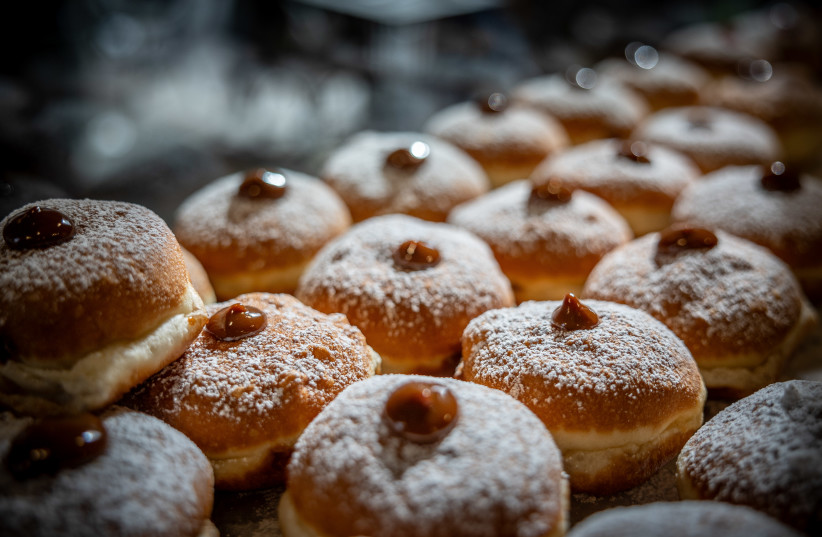
No one is contending that sufganiyot are healthy, but aside from tradition there is also the ongoing war to consider, and everyone knows there is no such thing as calories in wartime. (EDITOR’S NOTE: The Jerusalem Post does not officially endorse the claim that an ongoing war magically makes calories nonexistent, even if it wishes it were so. Sufganiyot are still very fattening and should be eaten in moderation.)
But not all jelly doughnuts are created equal. Which are the best of the best? Which sufganiyah will stand above the others, and which will all be red with jelly – that is, jealousy?
Naturally, we at In Jerusalem have taken it upon ourselves to answer these critical questions, doing the hard work so you, our beloved readers, don’t have to. In a truly herculean feat of investigative journalism, we prowled the streets of the capital to sample some of the best sufganiyot the city has to offer so you can decide how best to expend your holiday calories this year.
In order to do so, we decided to carry out our review by sampling eight sufganiyot and evaluating them on the basis of eight distinct and highly unscientific metrics – because Hanukkah is eight nights, and we’re not even remotely subtle.
Our eight metrics were as follows:
- Packaging
- Presentation
- Quantity of powdered sugar on top
- Oiliness
- Freshness
- Texture/density (breadiness)
- Jelly-to-dough ratio
- Jelly quality and taste
- Size/bang for your buck
So with that out of the way, here are In Jerusalem’s top eight sufganiyot for Hanukkah 2023. In order to ensure a level playing field, we sampled and are featuring only traditional jelly doughnuts. Keep in mind that the list is ordered from least to most impressive, all are available in Jerusalem, and all are kosher.
Disclaimer: The following article is the opinion of the authors and is not meant to be a definitive statement about the products and businesses in question.
Yolo
Yolo Bakery is a relatively new establishment, having opened a few years ago outside of the Clal Center. Since it opened, the store has greatly expanded, going from a small bakery to a veritable restaurant.
In 2022, Yolo was In Jerusalem’s dark horse victor in determining the city’s best cheesecake for Shavuot, beating out perennial heavy hitter Gagou de Paris.
This year, Yolo also decided to offer up sufganiyot of their own, so we were very excited to try them out.
However, it soon became apparent that they wouldn’t stack up to the rest of the competition.
The first problem was the packaging, being packed not even in a basic plastic container but a paper bag – one that very quickly became soaked in oil coming from the doughnuts themselves.
These doughnuts were larger than average but were missing out on points on presentation, being devoid entirely of sugar on top and being practically burnt. The dough itself was rather dense as well, with a less-than-desirable texture.
Then came the jelly. While the jelly-to-dough ratio wasn’t too bad, the jelly was of a vastly different quality. While most sufganiyot have sweet strawberry jelly, Yolo’s had tart blueberry jelly.
Aaron: “If I were trying to eat a blueberry tart pastry, it wouldn’t be too bad. But for a sufganiyah, it’s sadly lacking.”
Avi: “That’s like saying ‘I have such a good dog, he’s just like a kitten.’ But you don’t want a dog, you want a kitten.”
Aaron (who has two cats): “You’re going to upset a lot of our readers who are dog people.”
Avi (who also has two cats): “I’m sure they’ll find it in their hearts to forgive me.”
The final nail in this doughnut’s coffin for us, though, was the price. At NIS 12 a piece, it was by far the most expensive option, and for that price we expected something considerably better. Yolo is a great bakery with several delicious confections available, but sadly this one just didn’t measure up.
- Packaging: 3/10
- Presentation: 3/10
- Quantity of powdered sugar on top: 3/10
- Oiliness: 4/10
- Freshness: 4/10
- Texture/density: 5.5/10
- Jelly-to-dough ratio: 7/10
- Jelly quality and taste: 7/10
- Size/bang for your buck: 5/10
Final score: 4.5/10
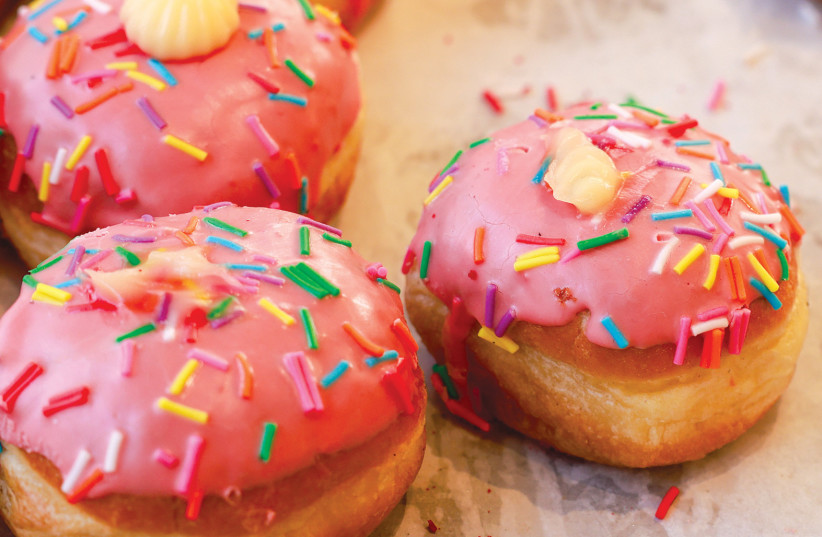
Ne’eman
Established in Jerusalem in 1944, the Ne’eman chain of cafes and bakeries has spread throughout the country, with over 50 locations nationwide. The Jerusalem Central Bus Station alone has three Ne’eman stores.
Going into any Ne’eman in Israel, one will see a number of different colorful doughnuts on display, covered in a variety of toppings and stuffed with different fillings.
But we’re only interested in the jelly, so that’s what we got.
Ne’eman’s doughnuts are reasonably priced (NIS 6) and immediately excelled in one particular area: packaging. The red to-go boxes are legitimately nice containers.
Avi: “This takes the CAKE – for packaging!”
However, that is sadly where our praise is going to end.
The freshness was poor, the presentation subpar, the texture was like stale bread, there was hardly any jelly, and the doughnuts themselves were smaller than normal.
Aaron: “These are small and disappointing.”
Avi: “This is an embarrassment.”
Ne’eman is redeemed to some extent by the fact it is giving some customers – particularly those in uniform – discounts due to the war. But we have to keep our eye on the prize.
Aaron: “A discount does not make a doughnut better.”
- Packaging: 9.5/10
- Presentation: 5/10
- Quantity of powdered sugar on top: 5.5/10
- Oiliness: 8.5/10
- Freshness: 5/10
- Texture/density: 4.5/10
- Jelly-to-dough ratio: 4.5/10
- Jelly quality and taste: 5.5/10
- Size/bang for your buck: 6/10
Final score: 6/10
Pe’er
The least expensive sufganiyah on the list, at NIS 5, had the bang-for-your-buck metric already in its favor. In addition, it also came with a pleasant amount of sugar on top.
However, these are the only two categories where it would exceed mediocrity.
Being the second most oily sufganiyah on the list, Pe’er already scored well below our average score in terms of oiliness. It also seemed less fresh, and its presentation was only barely passable.
But what stood out the most, and not in a good way, was what became apparent when we took a bite.
For starters, it wasn’t fully baked. The texture was very dense, to the extent that it could arguably function well as bread for a meat sandwich. That does not, however, a good sufganiyah make, and the overall score reflects our lack of enthusiasm.
Then there’s the jelly to consider. The doughnuts lacked the traditional dollop of jelly on top, which we missed more than we thought we would. There wasn’t quite enough jelly on the inside, either – and the jelly that was there wasn’t much to write home about.
Honorary doughnut sampler Erica: “It’s not horrific.”
That was the best praise we could offer.
- Packaging: 6/10
- Presentation: 6/10
- Quantity of powdered sugar on top: 8.5/10
- Oiliness: 6/10
- Freshness: 6/10
- Texture/density: 6/10
- Jelly-to-dough ratio: 6/10
- Jelly quality and taste: 5/10
- Size/bang for your buck: 8/10
Final score: 6.5/10
Angel’s Bakery
Angel’s Bakery is the largest bakery chain in Israel, a fixture in communities throughout the country. It has a lock on a huge swathe of the Israeli bread market and has been in the game for eight decades, having been founded in 1927.
So with a bakery with such history and prestige, with a reach greater than any other in the country, it naturally has sufganiyot of its own (NIS 6).
So how does it stack up?
The plain plastic packaging aside, right away one other doughnut on this list came to mind: Ne’eman’s. But this isn’t a bad thing.
Aaron: “It’s a lot like Ne’eman’s doughnuts, only better in every way – except for the packaging, of course.”
Indeed, it basically followed Ne’eman’s blueprint to a T, with the sole exception of making everything actually good. The presentation was well above par, the quantity of powdered sugar was excellent, the oiliness was tolerable, the freshness and texture were great, and the doughnut itself was well worth the price.
If it fell flat in any category, it was the jelly, and this was only slightly. Overall, a solid above-average doughnut, a reliable choice from a reliable and recognizable brand – but by no means was it the best.
- Packaging: 6/10
- Presentation: 8/10
- Quantity of powdered sugar on top: 8.5/10
- Oiliness: 8/10
- Freshness: 8/10
- Texture/density: 7.5/10
- Jelly-to-dough ratio: 7/10
- Jelly quality and taste: 6.5/10
- Size/bang for your buck: 8.5/10
Final score: 7.5/10
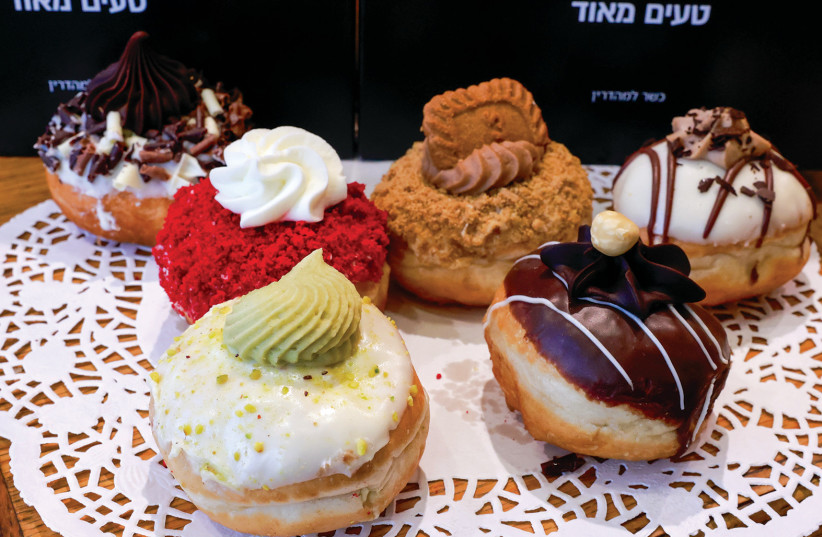
English Cake
In Jerusalem’s pick for best Hanukkah doughnut of 2022, the English Cake bakery chain – which has branches across Israel – offers a selection of colorful doughnuts this time of year, and they’re rather good.
This year, their sufganiyot (NIS 6) got high scores for the generous blanket of powdered sugar and overall texture.
However, like Angel’s Bakery, English Cake’s sufganiyot ultimately fell shy in the jelly category, in both the taste and the amount of the filling. In fact, when we cut one of the doughnuts in half, one of the halves didn’t have any jelly at all. Bit of a letdown.
Aaron: “At least their non-jelly doughnuts are still absolutely excellent, though; and their prices are very much worth it.”
- Packaging: 6/10
- Presentation: 8/10
- Quantity of powdered sugar on top: 8.5/10
- Oiliness: 8/10
- Freshness: 8.5/10
- Texture/density: 8/10
- Jelly-to-dough ratio: 5.5/10
- Jelly quality and taste: 7/10
- Size/bang for your buck: 7.5/10
Final score: 7.5/10
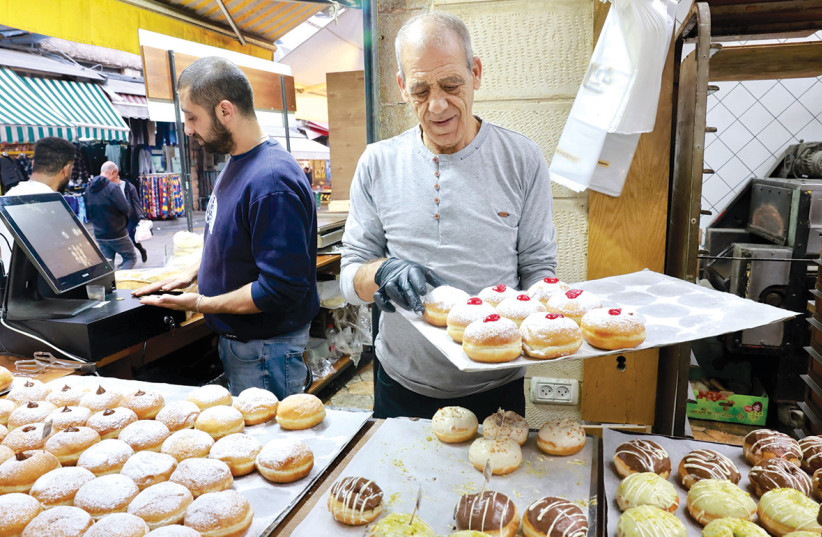
Duvshanit
We’ll say this: The sufganiyot (NIS 7) from Duvshanit – located in the open-air part of the Mahaneh Yehuda market – are enormous. And when we revealed them to our honorary doughnut taster, they were met with oohs and aahs.
Erica: “Gorgeous! Stunning!”
Right away, Duvshanit surpassed everyone else in one particular category: freshness.
Right after that was its texture, with the first bite into the doughnut revealing some of the lightest and least bread-like dough on our list.
Avi: “It’s like biting into a cloud!”
Accompanying that was the delightful surprise of a very generous jelly-to-dough ratio. But once again, here is where we run into our downside.
As we kept munching, there was a general sense of disappointment from the jelly itself, which – though plentiful – was judged too sweet and vaguely metallic in taste.
Then there’s the oiliness to consider, with this being one of the oilier options on this list.
Overall, Duvshanit did very nicely indeed, but it is clear there is still some room for improvement.
- Packaging: 7.5/10
- Presentation: 8.5/10
- Quantity of powdered sugar on top: 8/10
- Oiliness: 7/10
- Freshness: 9/10
- Texture/density: 8.5/10
- Jelly-to-dough ratio: 8.5/10
- Jelly quality and taste: 6.5/10
- Size/bang for your buck: 8.5/10
Final score: 8/10
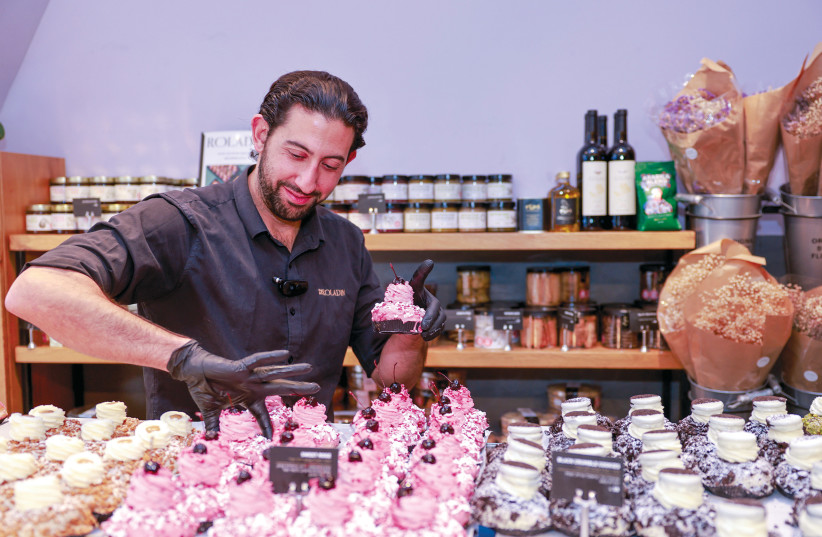
Roladin
For many bakeries in Israel, sufganiyot often seem like something they just churn out once a year, not putting much thought into it beyond making it seem somewhat appealing.
That is not the case with Roladin.
Long considered the benchmark for doughnut quality in Israel, its name is practically synonymous with artsy, and quite frankly delicious, doughnuts – helped by its sheer dominance, with at least 100 locations nationwide.
Its regular sufganiyot (NIS 7) were of substantial quality in their own right.
However, it did lose points in one major area: the sugar on top.
Making jelly-filled sufganiyot isn’t like making the other more elaborate, artisanal doughnuts that Roladin has on offer. It’s much simpler, and a little bit of sugar on top goes a long way – and at the same time, not enough of that sugar is a mark against it.
Especially if that’s combined with what seemed to us to be way too much jelly on top.
Avi: “We don’t need ungapatchka jelly.”
Aaron: “When you say it like that, you almost sound like you only care about how it will look on Instagram.”
Indeed, these flaws don’t take away from the fact that Roladin’s sufganiyot are of fantastic quality.
- Packaging: 9/10
- Presentation: 8/10
- Quantity of powdered sugar on top: 6/10
- Oiliness: 8.5/10
- Freshness: 8.5/10
- Texture/density: 8.5/10
- Jelly-to-dough ratio: 7/10
- Jelly quality and taste: 8/10
- Size/bang for your buck: 8.5/10
Final score: 8/10
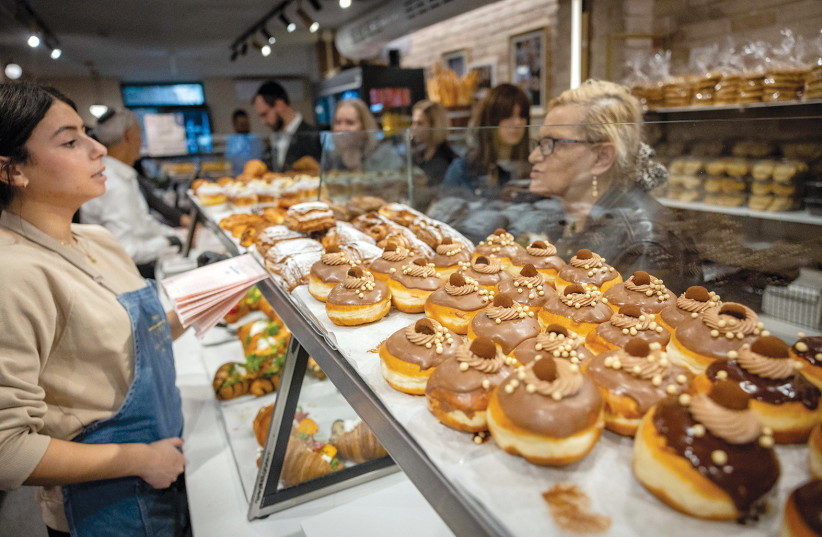
Gagou de Paris/Yehuda
Here we are. The creme de la creme of jelly-filled doughnuts. A confectionery delight so fabulous, it boasted near-perfect scores on half of our metrics.
Located on King George Street, the French-themed bakery has a justified reputation for being a bit pricier than most – and an equally justified reputation for being one of the best bakeries in the city.
And they are certainly proud of their doughnuts, having told In Jerusalem in 2022 that they are always some of the best that Israel’s capital has to offer.
But in a bakery famous for its elaborate French pastries, how would they manage a humble sufganiyah?
The answer: By making what is, hands down, the best jelly doughnut in Jerusalem.
Unsurprisingly, that actually made it rather hard to get. It took In Jerusalem multiple trips to the bakery to manage to secure any doughnuts (NIS 7) for this article, and even then we had to struggle with packed lines and a literal velvet rope limiting entry.
And it was worth it.
Aaron: “Gagou de Paris boasts of their quality, and they are right to do so. This doughnut was fantastic, and nothing could be better this Hanukkah.”
Avi: “I know where I’m getting my sufganiyot this year! We get to cut the line for ranking them first, right?”
Keep in mind, it did lose points for one specific metric: packaging. When In Jerusalem tried to purchase doughnuts from the store, they attempted to use a paper bag, only changing it to a bare bones plastic container upon request. Unfortunately, this cost it points – but even with that, it still beat out the rest of the pack.
- Packaging: 6/10
- Presentation: 8/10
- Quantity of powdered sugar on top: 8.5/10
- Oiliness: 8.5/10
- Freshness: 8.5/10
- Texture/density: 9/10
- Jelly-to-dough ratio: 9/10
- Jelly quality and taste: 9/10
- Size/bang for your buck: 9/10
Final score: 8.5/10
Final message: This Hanukkah, eat Jerusalem doughnuts!
While we undoubtedly had a lot of fun eating sufganiyot for this article, one cannot do so without thinking of the ongoing war in Gaza and how it has caused many businesses in Israel to suffer as a result.
Times are tough right now, and Jerusalem’s business owners have to deal with fewer tourists and Israelis alike, causing economic hardship for many.
While our list may be definitive for us, it is by no means definitive for everyone. Go out to Jerusalem and try all the sufganiyot you want. Doing so does more than just give you a tasty holiday treat; it also means more business for the city’s bakers – precisely at a time when they need it more than ever.
This year, buying and eating Jerusalem sufganiyot is more than just a part of celebrating Hanukkah – it’s about supporting each other in one of Israel’s darkest hours.
Hanukkah sameach. ❖
Gluten-free sufganiyot
For those of you who want to enjoy the sweet holiday delight of a sufganiyah but can’t eat gluten, don’t be discouraged. Gluten-free sufganiyot do exist, and they are fantastic.
Obviously, we couldn’t rank them alongside the others because the lack of gluten impacts the dough to such an extent that it wouldn’t be fair. But that doesn’t mean the doughnuts aren’t still excellent.
Take, for example, two specific gluten-free bakeries: Baked by Judith, located in Mahaneh Yehuda; and Kazze, located on Bezalel Street next to Nocturno.
Both bakeries have an excellent selection of gluten-free food on any given day, and for Hanukkah they certainly provide excellent sufganiyot.
Kazze’s doughnuts in particular stood out for being bigger than normal, with a texture that’s practically as fluffy as a cloud.
And both stores have more than just jelly-filled ones. They have a wide range of gluten-free doughnut options. Go try them yourself – we don’t think you’ll be disappointed.
Who we didn’t include – and why
Jerusalem’s doughnut connoisseurs will surely notice two glaring omissions from the list of establishments whose sufganiyot we sampled: Marzipan and Kadosh.
In the case of Marzipan – the legendary downtown bakery whose gooey rugelach are beloved by yeshiva and seminary students and Birthright participants from around the world – the reason was simple: Try as we did, we just couldn’t get our hands on any of their sufganiyot.
We visited three times, on two separate days, and each time were told, with a shrug, that they didn’t have any and didn’t know when they would. This particularly upset Avi, whose personal 2022 sufganiyah ranking featured Marzipan in first place (Aaron, whose 2022 ranking had Marzipan in last place, wasn’t too upset), but there was nothing to be done. Trust us – we tried.
As for Kadosh – whose elaborate doughnuts draw massive crowds and generate lines that crawl up Shlomzion Hamalka Street throughout the holiday – we were informed by a bakeshop representative that they don’t have traditional jelly doughnuts this year.
Instead, as a gesture to the armed forces during the war, their entire seasonal doughnut collection is IDF-themed, with different doughnuts representing different army units. While we salute their patriotism and creativity, the absence of a traditional sufganiyah from their lineup sadly disqualifies them from the rankings.
We look forward to including Kadosh in next year’s rankings – hopefully, in more peaceful times.
This sufganiyah round-up is dedicated in memory of Phillip Brieff, Aaron Reich’s beloved grandfather, a lifelong lover of sweets and a dedicated reader of The Jerusalem Post, who passed away at the age of 93 during the writing of this article.
